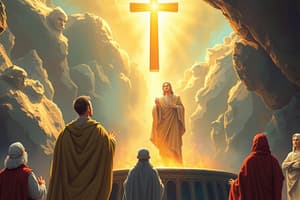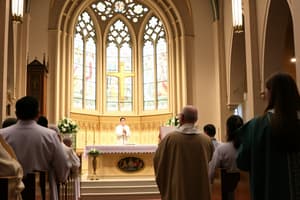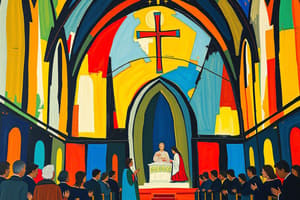Podcast
Questions and Answers
What is the primary role of responsibility in the context of freedom of choice?
What is the primary role of responsibility in the context of freedom of choice?
- It emphasizes the importance of self-interest.
- It is a restriction that limits personal growth.
- It allows individuals to act without consequences.
- It ensures accountability for actions taken. (correct)
Which of the following best describes the concept of true freedom as explained in the content?
Which of the following best describes the concept of true freedom as explained in the content?
- The power to make responsible choices aligned with moral law. (correct)
- The liberty to make choices that do not affect others.
- The pursuit of personal happiness above all else.
- The ability to do whatever one desires without limitations.
What is the main implication of Genesis 2:15 regarding human stewardship?
What is the main implication of Genesis 2:15 regarding human stewardship?
- Humans are to dominate over nature without care.
- Humans should only focus on their own needs.
- Humans have no obligations towards the earth.
- Humans are called to cultivate and care for creation. (correct)
How can societal conditions impact freedom, according to the content?
How can societal conditions impact freedom, according to the content?
What consequence does sin have according to Catholic teaching?
What consequence does sin have according to Catholic teaching?
Which aspect reflects the Catholic Church's view on the human person as a social being?
Which aspect reflects the Catholic Church's view on the human person as a social being?
What role does natural law play in moral decision-making according to Catholic teaching?
What role does natural law play in moral decision-making according to Catholic teaching?
Which of the following is NOT considered a threat to freedom?
Which of the following is NOT considered a threat to freedom?
What does the moral law guide in a human's life?
What does the moral law guide in a human's life?
What is the outcome of the misuse of freedom as stated in the content?
What is the outcome of the misuse of freedom as stated in the content?
What is indicated as the primary source of redemption within the context provided?
What is indicated as the primary source of redemption within the context provided?
What is the significance of procreation as outlined in Gen 1:28?
What is the significance of procreation as outlined in Gen 1:28?
Which concept is explicitly rejected in the discussion on freedom?
Which concept is explicitly rejected in the discussion on freedom?
How does the Catholic Church view free will in the context of moral responsibility?
How does the Catholic Church view free will in the context of moral responsibility?
Which statement best describes the concept of the common good?
Which statement best describes the concept of the common good?
What is one of the fundamental roles of the family in society according to Catholic teaching?
What is one of the fundamental roles of the family in society according to Catholic teaching?
What is the fundamental focus of Catholic anthropology?
What is the fundamental focus of Catholic anthropology?
What does the dignity of the human person stem from in Catholic teaching?
What does the dignity of the human person stem from in Catholic teaching?
Which of the following best describes the relationship between body and soul in Catholic teaching?
Which of the following best describes the relationship between body and soul in Catholic teaching?
Which aspect does NOT highlight the image of God within each person?
Which aspect does NOT highlight the image of God within each person?
What does intrinsic worth imply in relation to human dignity?
What does intrinsic worth imply in relation to human dignity?
In Catholic teaching, what role does the soul play in relation to the body?
In Catholic teaching, what role does the soul play in relation to the body?
Which of the following reflects a key characteristic of human beings as per Catholic teaching?
Which of the following reflects a key characteristic of human beings as per Catholic teaching?
What does respect for all imply in the context of Catholic teachings on human dignity?
What does respect for all imply in the context of Catholic teachings on human dignity?
Flashcards are hidden until you start studying
Study Notes
Introduction to Catholic Anthropology
- Catholic anthropology explores the human person, encompassing physical and spiritual nature, their relationship with God, and social dimension.
- It provides a framework for understanding ourselves from a Catholic perspective.
Nature
- Explores the physical and spiritual makeup of human beings.
- Examines what makes us human.
Relationship with God
- Explores our connection with the divine.
- How this connection shapes our lives.
Social Dimension
- Focuses on our place in the world, including our relationships with others.
The Dignity of the Human Person
- Catholic teachings emphasize each human's inherent dignity.
- This dignity stems from our creation in God's image and likeness, granting us inherent worth and value, regardless of our circumstances.
Created in God's Image
- We are created in God's image and likeness, reflecting the divine.
Intrinsic Worth
- Humans possess inherent value and dignity, regardless of our status or achievements.
Respect for All
- All humans deserve respect and care, as each person is a reflection of God.
The Human Person as Created in the Image of God
- The image of God within us reflects our intellectual capacity, our ability to love, and our inherent dignity.
- It highlights our capacity for creativity, responsibility, and self-governance.
Intellectual Capacity
- Our ability to reason, think critically, and seek knowledge
Love & Compassion
- Our capacity for love, empathy, and forming relationships.
Dignity & Purpose
- Our inherent worth and the call to live meaningful lives.
The Human Person as a Body-Soul Composite
- Catholic teaching states that human beings are a unity of body and soul, inseparable and interconnected.
- The soul, the immaterial essence of a person, animates and gives life to the body.
- Together, they form a single, integrated being.
Unity of Body and Soul
- The soul animates the body, forming a single, integrated being.
Inseparable
- Body and soul are interconnected, each influencing the other.
Complementary
- Body and soul work together, forming a complete human person.
The Human Person as a Steward of Creation
- The basis of the stewardship tradition is found in Genesis 2:15 where God establishes man and woman in the garden and tells them to “cultivate and take care of it”
- Humans are called into a relationship with God and are called to care for creation.
Nature/Earth
- We take care of our common home.
Procreation/Life
- God commands us to be fruitful and multiply.
- Bringing forth new life fulfills God's plan for marriage.
Self/Neighbor/Family
- “Thou shalt love thy neighbor as thyself.” (Matthew 22: 35-40).
The Human Person as a Social Being
- Catholic teaching recognizes the social nature of the human person, emphasizing our inherent need for relationships and our call to live in community.
- It promotes a view of human beings as interconnected and interdependent.
Family
- Fundamental unit of society, providing love and support.
Community
- Shared experiences and responsibilities, fostering belonging and solidarity.
Common Good
- Well-being of the entire community, promoting justice and equity.
The Human Person and the Moral Law
- Catholic Church teaches that the human person is called to live in accordance with God's moral law.
- This law is revealed through natural law, Scripture, and the Church's teachings.
- It guides our actions and helps us discern right from wrong.
Natural Law
- An innate understanding of right and wrong, inscribed in our hearts.
Divine Revelation
- God's guidance through Scripture, providing moral principles and teachings.
Church Teaching
- Interpretation and application of moral principles in contemporary life.
The Human Person and Free Will
- Catholic teaching affirms the human person's free will, the capacity to make choices and act upon them.
- However, this freedom is guided by reason and moral law.
Freedom of Choice
- Capacity to make decisions and act upon them.
- Responsibility for our choices and actions.
Guidance
- Moral law and reason help us navigate choices.
The Human Person and Sin
- Sin is a violation of God's law and turning away from God's love.
- It can be understood as a personal choice to act contrary to the good, often stemming from pride, selfishness, and a lack of trust in God.
Consequences of Sin
- Sin separates us from God, creates disharmony, and harms ourselves and others.
Hope for Redemption
- God's mercy and love offer forgiveness and the possibility of healing from sin.
The Human Person and Redemption
- Through Jesus Christ, we are offered redemption and salvation from sin.
Studying That Suits You
Use AI to generate personalized quizzes and flashcards to suit your learning preferences.




